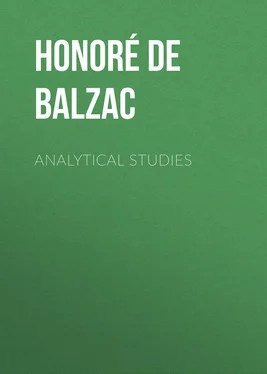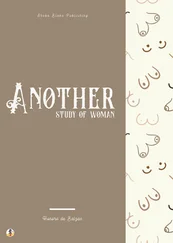Honoré Balzac - Analytical Studies
Здесь есть возможность читать онлайн «Honoré Balzac - Analytical Studies» — ознакомительный отрывок электронной книги совершенно бесплатно, а после прочтения отрывка купить полную версию. В некоторых случаях можно слушать аудио, скачать через торрент в формате fb2 и присутствует краткое содержание. Жанр: literature_19, foreign_antique, foreign_prose, на английском языке. Описание произведения, (предисловие) а так же отзывы посетителей доступны на портале библиотеки ЛибКат.
- Название:Analytical Studies
- Автор:
- Жанр:
- Год:неизвестен
- ISBN:нет данных
- Рейтинг книги:5 / 5. Голосов: 1
-
Избранное:Добавить в избранное
- Отзывы:
-
Ваша оценка:
- 100
- 1
- 2
- 3
- 4
- 5
Analytical Studies: краткое содержание, описание и аннотация
Предлагаем к чтению аннотацию, описание, краткое содержание или предисловие (зависит от того, что написал сам автор книги «Analytical Studies»). Если вы не нашли необходимую информацию о книге — напишите в комментариях, мы постараемся отыскать её.
Analytical Studies — читать онлайн ознакомительный отрывок
Ниже представлен текст книги, разбитый по страницам. Система сохранения места последней прочитанной страницы, позволяет с удобством читать онлайн бесплатно книгу «Analytical Studies», без необходимости каждый раз заново искать на чём Вы остановились. Поставьте закладку, и сможете в любой момент перейти на страницу, на которой закончили чтение.
Интервал:
Закладка:
Every one can recognize the operation of this influence in the case of his neighbor, and it is one of the things which exclude the majority of husbands from the honeymoon. It is thus that the wise man, survivor of all reefs and shoals, such as we have pointed out, sometimes falls into the snares which he himself has set.
I have myself noticed that man deals with marriage and its dangers in very much the same way that he deals with wigs; and perhaps the following phases of thought concerning wigs may furnish a formula for human life in general.
FIRST EPOCH. – Is it possible that I shall ever have white hair?
SECOND EPOCH. – In any case, if I have white hair, I shall never wear a wig. Good Lord! what is more ugly than a wig?
One morning you hear a young voice, which love much oftener makes to vibrate than lulls to silence, exclaiming:
"Well, I declare! You have a white hair!"
THIRD EPOCH. – Why not wear a well-made wig which people would not notice? There is a certain merit in deceiving everybody; besides, a wig keeps you warm, prevents taking cold, etc.
FOURTH EPOCH. – The wig is so skillfully put on that you deceive every one who does not know you.
The wig takes up all your attention, and amour-propre makes you every morning as busy as the most skillful hairdresser.
FIFTH EPOCH. – The neglected wig. "Good heavens! How tedious it is, to have to go with bare head every evening, and to curl one's wig every morning!"
SIXTH EPOCH. – The wig allows certain white hairs to escape; it is put on awry and the observer perceives on the back of your neck a white line, which contrasts with the deep tints pushed back by the collar of your coat.
SEVENTH EPOCH. – Your wig is as scraggy as dog's tooth grass; and – excuse the expression – you are making fun of your wig.
"Sir," said one of the most powerful feminine intelligences which have condescended to enlighten me on some of the most obscure passages in my book, "what do you mean by this wig?"
"Madame," I answered, "when a man falls into a mood of indifference with regard to his wig, he is, – he is – what your husband probably is not."
"But my husband is not – " (she paused and thought for a moment). "He is not amiable; he is not – well, he is not – of an even temper; he is not – "
"Then, madame, he would doubtless be indifferent to his wig!"
We looked at each other, she with a well-assumed air of dignity, I with a suppressed smile.
"I see," said I, "that we must pay special respect to the ears of the little sex, for they are the only chaste things about them."
I assumed the attitude of a man who has something of importance to disclose, and the fair dame lowered her eyes, as if she had some reason to blush.
"Madame, in these days a minister is not hanged, as once upon a time, for saying yes or no; a Chateaubriand would scarcely torture Francoise de Foix, and we wear no longer at our side a long sword ready to avenge an insult. Now in a century when civilization has made such rapid progress, when we can learn a science in twenty-four lessons, everything must follow this race after perfection. We can no longer speak the manly, rude, coarse language of our ancestors. The age in which are fabricated such fine, such brilliant stuffs, such elegant furniture, and when are made such rich porcelains, must needs be the age of periphrase and circumlocution. We must try, therefore, to coin a new word in place of the comic expression which Moliere used; since the language of this great man, as a contemporary author has said, is too free for ladies who find gauze too thick for their garments. But people of the world know, as well as the learned, how the Greeks had an innate taste for mysteries. That poetic nation knew well how to invest with the tints of fable the antique traditions of their history. At the voice of their rhapsodists together with their poets and romancers, kings became gods and their adventures of gallantry were transformed into immortal allegories. According to M. Chompre, licentiate in law, the classic author of the Dictionary of Mythology , the labyrinth was 'an enclosure planted with trees and adorned with buildings arranged in such a way that when a young man once entered, he could no more find his way out.' Here and there flowery thickets were presented to his view, but in the midst of a multitude of alleys, which crossed and recrossed his path and bore the appearance of a uniform passage, among the briars, rocks and thorns, the patient found himself in combat with an animal called the Minotaur.
"Now, madame, if you will allow me the honor of calling to your mind the fact that the Minotaur was of all known beasts that which Mythology distinguishes as the most dangerous; that in order to save themselves from his ravages, the Athenians were bound to deliver to him, every single year, fifty virgins; you will perhaps escape the error of good M. Chompre, who saw in the labyrinth nothing but an English garden; and you will recognize in this ingenious fable a refined allegory, or we may better say a faithful and fearful image of the dangers of marriage. The paintings recently discovered at Herculaneum have served to confirm this opinion. And, as a matter of fact, learned men have for a long time believed, in accordance with the writings of certain authors, that the Minotaur was an animal half-man, half-bull; but the fifth panel of ancient paintings at Herculaneum represents to us this allegorical monster with a body entirely human; and, to take away all vestige of doubt, he lies crushed at the feet of Theseus. Now, my dear madame, why should we not ask Mythology to come and rescue us from that hypocrisy which is gaining ground with us and hinders us from laughing as our fathers laughed? And thus, since in the world a young lady does not very well know how to spread the veil under which an honest woman hides her behavior, in a contingency which our grandfathers would have roughly explained by a single word, you, like a crowd of beautiful but prevaricating ladies, you content yourselves with saying, 'Ah! yes, she is very amiable, but,' – but what? – 'but she is often very inconsistent – .' I have for a long time tried to find out the meaning of this last word, and, above all, the figure of rhetoric by which you make it express the opposite of that which it signifies; but all my researches have been in vain. Vert-Vert used the word last, and was unfortunately addressed to the innocent nuns whose infidelities did not in any way infringe the honor of the men. When a woman is inconsistent the husband must be, according to me, minotaurized . If the minotaurized man is a fine fellow, if he enjoys a certain esteem, – and many husbands really deserve to be pitied, – then in speaking of him, you say in a pathetic voice, 'M. A – is a very estimable man, his wife is exceedingly pretty, but they say he is not happy in his domestic relations.' Thus, madame, the estimable man who is unhappy in his domestic relations, the man who has an inconsistent wife, or the husband who is minotaurized are simply husbands as they appear in Moliere. Well, then, O goddess of modern taste, do not these expressions seem to you characterized by a transparency chaste enough for anybody?"
"Ah! mon Dieu!" she answered, laughing, "if the thing is the same, what does it matter whether it be expressed in two syllables or in a hundred?"
She bade me good-bye, with an ironical nod and disappeared, doubtless to join the countesses of my preface and all the metaphorical creatures, so often employed by romance-writers as agents for the recovery or composition of ancient manuscripts.
As for you, the more numerous and the more real creatures who read my book, if there are any among you who make common cause with my conjugal champion, I give you notice that you will not at once become unhappy in your domestic relations. A man arrives at this conjugal condition not suddenly, but insensibly and by degrees. Many husbands have even remained unfortunate in their domestic relations during their whole life and have never known it. This domestic revolution develops itself in accordance with fixed rules; for the revolutions of the honeymoon are as regular as the phases of the moon in heaven, and are the same in every married house. Have we not proved that moral nature, like physical nature, has its laws?
Читать дальшеИнтервал:
Закладка:
Похожие книги на «Analytical Studies»
Представляем Вашему вниманию похожие книги на «Analytical Studies» списком для выбора. Мы отобрали схожую по названию и смыслу литературу в надежде предоставить читателям больше вариантов отыскать новые, интересные, ещё непрочитанные произведения.
Обсуждение, отзывы о книге «Analytical Studies» и просто собственные мнения читателей. Оставьте ваши комментарии, напишите, что Вы думаете о произведении, его смысле или главных героях. Укажите что конкретно понравилось, а что нет, и почему Вы так считаете.












